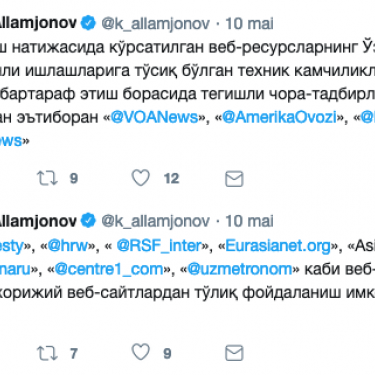Uzbekistan unblocks many independent news sites

Reporters Without Borders (RSF) hails Uzbekistan’s decision to finally unblock many long-censored news websites and urges the authorities to restore access to those that are still blocked, to lift the obstacles to independent journalism and to allow a broader debate about the repression of recent decades.
Internet users in Uzbekistan regained access to a dozen of independent news sites on 11 May, including such leading news sources as Ferghana, Uzmetronom, AsiaTerra, Eurasianet, Voice of America, BBC Uzbek and Deutsche Welle. Many of them had been blocked since the 2005 massacre in the eastern city of Andijan.
Uzbek Information and Mass Communication Agency director Komil Allamjonov also announced that access to RSF’s website, which has been blocked intermittently, would henceforth be fully restored, as would access to the sites of other leading human rights NGOs such as Human Rights Watch and Amnesty International.
These measures follow the unblocking of several social networks and instant messaging services. The sites of several other media outlets – including Radio Free Europe/Radio Liberty's Uzbek service Radio Ozodlik, and Eltuz – are nonetheless still blocked.
“It is great news that Uzbekistan is running counter to the general trend in Central Asia, where Internet censorship keeps on expanding,” said Johann Bihr, the head of RSF’s Eastern Europe and Central Asia desk.
“We urge the authorities to restore access to the sites that are still blocked and to carry out all the reforms needed to fully establish press freedom in Uzbekistan. They must abandon all use of censorship and surveillance, make it easier for independent journalists to get accreditation and to work, and render justice to the victims of the abuses of the past decades.”
The lifting of censorship on news sites is the latest phase in a progressive thaw that began after President Islam Karimov’s death in 2016. Imprisoned journalists – some of whom had been held for nearly 20 years – have been released, live political broadcasts have made an appearance and some media outlets are now covering sensitive subjects such as corruption and forced labour.
But surveillance, censorship and self-censorship maintain a significant presence in what was one of the planet’s harshest dictatorships. Police raided journalist and poet Mahmud Rajabov’s home in Khorezm province on 10 May, while NGOs criticized the continuing harassment of Dilmurod Sayyid, a human rights defender and former journalist who was released in 2018 after nine years in prison.
Uzbekistan rose five places in RSF’s 2019 World Press Freedom Index but is still ranked very low – 160th out of 180 countries. Allamjonov referred to its ranking last week. “This means we still have much to do to guarantee free speech and journalists’ rights,” he said. “We must progress in this domain because all contemporary politics and the reforms we are carrying out are closely linked to free speech and freedom of the press.”



